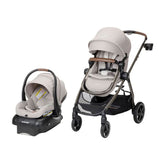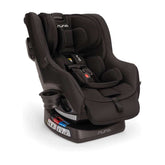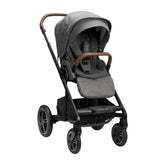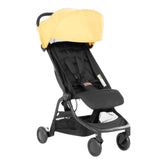9 Tips for How to Soothe a Baby with Colic

Babies cry for a variety of reasons. It’s basically the only way they have to communicate their needs, whether it’s hunger, comfort, or a diaper change. While crying is normal, babies suffering from colic cry far more, are incredibly difficult to console, and cause a lot of anxiety in their caregivers. With colic, the crying begins suddenly for no obvious reason … and has no obvious cure.
What Colic Is
“Colic” is simply a broad term for extreme crying in otherwise healthy infants. It’s not a diagnosis or illness. Rather, it’s a combination of puzzling behaviors. It usually begins at approximately two weeks of age and goes away by four months of age. These fussy spells can occur any time of the day, although they often become worse in the early evening between 6:00 p.m. and midnight. Colicky infants cry inconsolably, frequently screaming, stretching or drawing up their legs, and passing gas. Colic is fairly common, affecting about 20 percent of infants.
What Causes Colic
While the cause of colic is unknown, it may be triggered by a number of issues:
- gas (air swallowed while nursing or crying)
- reflux (bringing up) of stomach contents
- food allergies
- milk-protein intolerance
- family or caregiver stress
Tips for Soothing a Baby with Colic
Trying to soothe a colicky infant can be exhausting, frustrating, and heartbreaking. Often caregivers simply have to wait it out (and try to keep themselves calm in the process). There are a few techniques that may help ease the strain during their witching hour. If you sense that something beyond normal fussiness is going on with your child, consult your pediatrician for insights into any potential medical issues that may require treatment.
1. Consider dietary changes
Nursing parents may consider eliminating dairy products, caffeine, onions, cabbage, and any other potentially irritating foods from their own diet, one at a time (discuss with your pediatrician). This may take a couple of weeks to see changes. Ask your baby’s doctor about switching to a protein hydrolysate formula. Colic is rarely caused by food sensitivity, but in some instances, a switch may provide quick relief.
Dr. Brown’s™ Options+™ Anti-Colic Baby Bottle Essentials Gift Set is clinically proven to reduce colic and decrease spit-up, burping, and gas. This baby essentials gift set includes three nipple levels - slow-flow, medium-flow, and medium-fast flow - so the baby bottle set grows with your baby.

Dr. Brown’s™ Options+™ Anti-Colic Baby Bottle Essentials Gift Set
2. Avoid overfeeding
Feeding your little one too much can cause discomfort. Try to wait at least two to two-and-a-half hours from the start of one feeding to the start of the next.
3. Limit stimulation
Restrict visitors and avoid new, stimulating environments and experiences during the late afternoon and early evening. Try to keep noise to a minimum, sing or speak in soothing tones (or not at all), and dim the lights.
4. Try white noise
White noise refers to sounds that mask other sounds that might occur naturally in an environment. A landmark 1990 study found that 80 percent of newborns were able to fall asleep after five minutes of hearing white noise. Run the vacuum, a fan, or a white-noise machine to create a comfortable, calming environment that encourages your baby to stop crying and fall asleep faster.
5. Treat tummy troubles
Place your little one tummy-down across your lap or tummy against your shoulder. Then gently rub or pat her back as you hold her. Burping may also alleviate gastrointestinal discomfort.
Anti-gas drops made with simethicone may also help break up gas bubbles and relieve your baby's symptoms. Some parents also swear by gripe water, an over-the-counter liquid supplement of sodium bicarbonate and herbs. Always consult your pediatrician before administering any medication, herbal or otherwise, marketed as a treatment for baby colic.
Boiron ColicComfort Homeopathic Medicine for Colic & Gas Relief relieves baby colic symptoms, including gas pain and irritability. Simply squeeze the small pre-measured dose into the mouth of a gassy baby with colicky pain. The clear and tasteless liquid is absorbed sublingually. Free of preservatives, flavors, dyes, lactose, sugar, or artificial sweeteners.

Boiron ColicComfort Homeopathic Medicine for Colic & Gas Relief
6. Try swaddling
For some babies, being snuggly wrapped in a large, thin blanket helps them feel more secure and calms them down.
7. Walk, rock, or bounce
Rock them in a rocking chair. Put them in a sling or baby carrier and wear them around the house. Cuddling, wearing, or carrying your baby gives them a sense of comfort and security. (The gentle, rhythmic motion is similar to what they experienced in the womb.) It may also help you better tune in to their needs.
8. Offer a pacifier
Many babies suffering from colic find sucking soothing. If your little one seems exceptionally famished, try offering a pacifier. For some infants, it offers instant relief.
9. Take a break
Step outside with your little one. Sometimes a ride in the stroller, a walk outside, or a ride in the car is just the change of scenery your baby needs to help shift their mood.
While the relentless crying and screaming don’t appear to hurt the baby, a colic episode can leave parents feeling frazzled, upset, and completely stressed out. If you're feeling edgy and tense, ask a family member or a friend to watch the baby for a little while — and get out of the house. Even a couple of hours away can help you mentally reboot. If you don’t have another adult available to help, it's alright to lay your infant on their back in the crib or another safe place and leave the room for a few minutes.
When to Call the Doctor
While there’s a pretty good chance that your little one’s marathon crying sessions are simply colic, excessive, inconsolable crying may be a symptom of other issues. Consult your pediatrician to rule out any other potential causes or underlying medical conditions. If nothing else, it can be helpful to get reassurance from a pro that you’re simply dealing with colic and that it will eventually pass.
Be sure to fully describe your baby’s episodes to your pediatrician. Include details like potential triggers, duration and intensity of the crying, or changes in your routine. This can help the doctor investigate or eliminate other possible explanations for the crying, like an ear infection or reflux.
The Takeaway on Soothing a Baby With Colic
Remember, colic doesn’t last forever. Just when you think you’ve had all you can take, the fussy period will ease up a bit – and then disappear forever. Though you may feel exhausted and depleted, take a deep breath and smile. You’ve just prevailed over a major parenting milestone.









